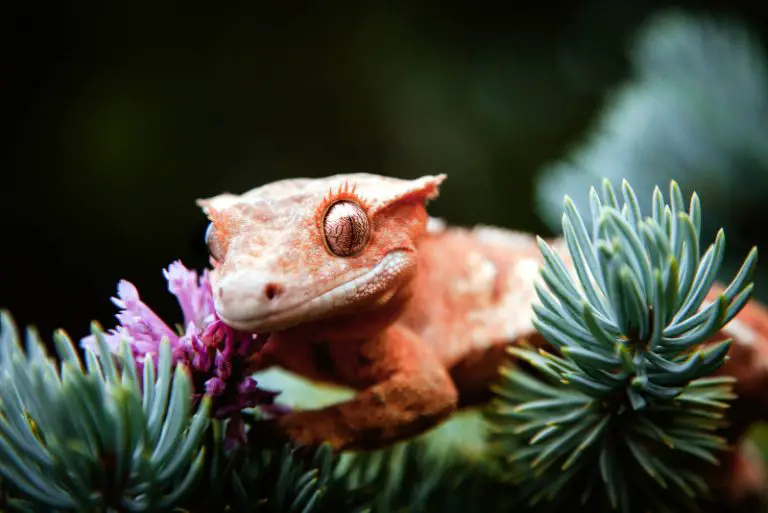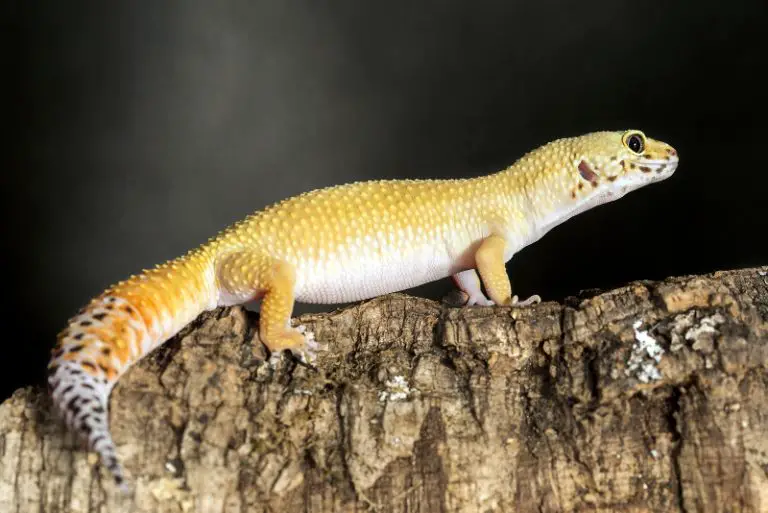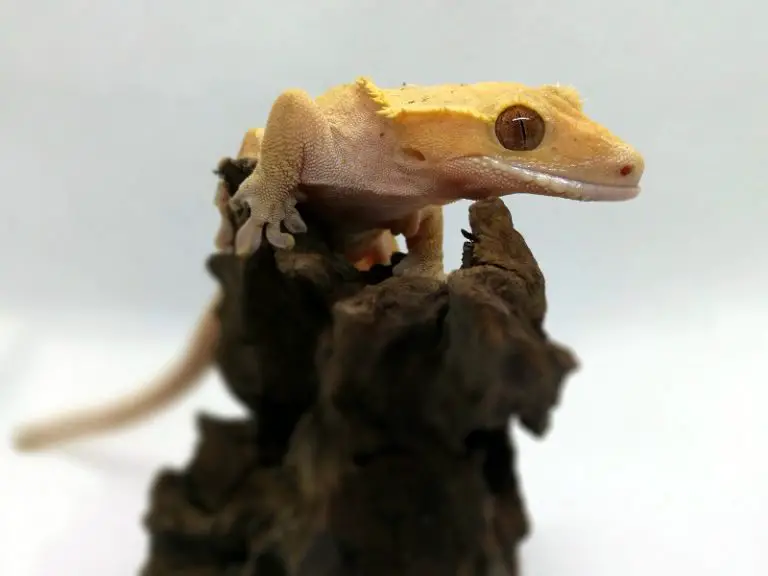Can Geckos Swim? [Must Read]
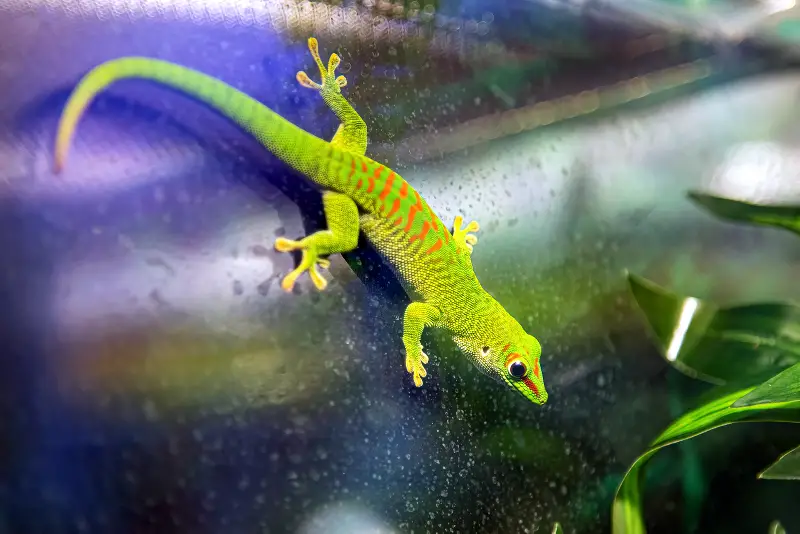
You’ve probably heard conflicting responses on whether geckos can swim. Some people say they can swim, others say they can’t. Some people say their geckos enjoy swimming, while others say you should never risk it. This can be quite confusing. What are you supposed to do? Do geckos swim? Should you let them swim? We’re going to cover the basics here.

Contents
Table of Contents
What Are Geckos?
There are thousands of different kinds of geckos. Many of them are considered great pets. Some of the most popular species are the crested, leopard, house, day, and fat-tailed geckos.
Most geckos are friendly critters and are considered great pets. They are inexpensive compared to other lizard species. They also like to be handled.
So, what is a gecko? Geckos are a reptile naturally found on every continent except Antarctica. They are most commonly found in deserts and rainforests. They’re also found in some cold mountain regions.
Geckos have tails that help them to survive. They use their tails to balance and climb. It’s where they store fat and energy. They also use it as camouflage. If they find themselves in danger, they can even drop their tails to escape.
Most geckos are nocturnal, choosing to come out at night when they’re most active. Most are also insectivores, feasting mainly on insects. Although, some like to eat fruits and veggies, too.
Can Geckos Swim?
Whether geckos can swim seems to be debated. Some say that they can swim, while others say that they absolutely can’t.
The general consensus seems to be that geckos can swim, but they don’t really enjoy doing it.
They’re also not very good swimmers. They aren’t designed for swimming, and they can’t do it for extended periods of time. It’s not something they’ll do by choice. Rather, they’ll only do it if it’s needed for survival.
Running Over Water
One fun fact that most people don’t know is that geckos can run over the surface of water. Researchers have witnessed them running over water surfaces. This is a survival tactic to get away from predators.
You may be wondering how this is possible. Some species of geckos are incredibly fast. They can run at speeds of a few feet per second, allowing them to seemingly glide over water.
They also use the surface tension of the water to achieve this. They can slap all four of their limbs against the surface of the water at the same time. They slap their limbs against the water, creating a little pocket of air between their limb and the surface of the water. This makes it easier to stay above the surface.
Additionally, gecko skin is unique in that it’s hydrophobic. Hydrophobic simply means that something doesn’t “like” water. In the case of geckos, it means that water won’t absorb into their skin. Instead, a droplet of water will just sit on the surface. This property also helps them to stay above the water.
Geckos can undulate their bodies. They move in a wave-like motion while crossing the surface of the water. By basically moving with the motion of the water, they can more easily along its surface.
Supervised Swimming
A gecko swimming is a rare occurrence. Still, some gecko owners argue that their geckos like to swim. If you want to try giving your gecko some exercise by swimming, just use caution.
Clearly, if your gecko appears distressed, remove them from the situation immediately. If they appear to be enjoying themselves, you still need to keep a close eye on them. Unfortunately, things can go wrong in a matter of seconds.
Here are some steps to take to keep supervised swimming safe:
- Fill a container with water no more than a couple inches deep.
- Place rocks throughout the container. This will give your gecko places to rest when they become tired.
- Place a log in the water. This acts as a resting spot like the rocks. Both rocks and logs can be used as a make-shift ladder as well.
- Only use pure water. Never use any additives like soap. Soap hinders a gecko’s ability to swim.
Can Crested Geckos Swim?
Crested geckos can technically swim, just like other geckos. Still, they don’t like it and it can be quite stressful. Unlike other geckos who live on the ground, crested geckos are arboreal and live in trees. With their natural habitat consisting of trees, it’s no wonder they become nervous around water.
Why Shouldn’t Geckos Swim?
Geckos really don’t like to swim. You shouldn’t provide them with large dishes of water in their enclosures. It’s not recommended to make them swim as a form of exercise either because you’ll just stress them out.
Geckos really only swim as a form of defense, so it stresses them out having to do it.
They Can Drown
Large bodies of water stress geckos out. Although they can swim, they don’t like to do it, and they can’t do it for extended periods of time. If, for some reason they find themselves in water that they can’t get out of, they can drown.
Researchers have found that geckos can hold their breath for up to one minute. Still, they will drown if they are trapped in a body of water for too long.
Respiratory Distress
Geckos are cold-blooded animals. Their body temperature is regulated by the surrounding environment. Because most water is quite cold, it can drastically change the body temperature of a gecko.
Once becoming too cold, they may leave the water and seek out a heat source. They may overcompensate by staying under the heat source for too long. They will then become overheated and reenter the water to cool off.
This cycle can continue, and it will cause strain on the gecko’s body. It’s best for a gecko’s body temperature to be closely regulated. Constant shifts of their body temperature can cause respiratory infections.
Immune System Troubles
Besides respiratory infections, temperature shifts can also cause immune troubles. Problems with the immune system can cause troubles with growth and secondary infection. They are much more likely to develop fungal, bacterial, or viral infections.
Bathing
Don’t bother giving your gecko a bath. They have self-cleaning properties that makes bathing them unnessessary. Similar to swimming, bathing stresses geckos out and doesn’t need to be done.
Geckos, like many lizards, shed regularly. This is a form of self-cleaning. When they shed, a new, clean layer of skin will take the old skin’s place.
You can also do your part to help keep your lizard clean that doesn’t involve bathing them. Keeping their enclosure clean will work wonders. You should spot clean their tank daily, removing any old feces and food.
Tankmates
It’s not recommended to keep your gecko with any tankmates that live in water. Many people split their terrariums so that half is land and half is water. This works for many species, but it’s not a good idea with geckos.
Geckos should be closely supervised whenever they’re around deeper bodies of water. If you keep them with a tankmate that requires a large body of water, the gecko may drown without you realizing.
Watch this video: Can Geckos Swim?
Do Geckos Need Water?
To Drink
All animals need a source of water to drink. Geckos will die if they go more than 3 days without water. Even though they don’t like a lot of water, you should provide them with a small soaking dish to rest in.
You should also spray them several times a day so that they have water to lick off the surface of their terrarium.
Although geckos are scared of larger bodies of water, they’re not scared of rain or mist. They’re not going to drown in mist. Most geckos like mist or rain. It keeps them cool, hydrated, and gives them a great source of drinking water.
Humidity & Body Temperature
Geckos need humidity for their bodies to stay healthy. You should read up on how much humidity your species of gecko needs, but it’s usually on the higher end. Without proper humidity, they can become dehydrated and sick.
One way that humidity is helpful is in regulating body temperature. Without the correct humidity, it becomes harder for a gecko to regulate their body temperature. To compensate, they may drink more. This is why it’s important they always have access to a water dish.
For the same reason, you should keep their water dish in a cooler area of the terrarium. If they need to cool themselves down, drinking cool water is the best way to do it. Provide them with a cool area around 70-77 degrees where the water bowl will be kept.
Soaking
Although geckos don’t like to bathe or swim, they do sometimes like to soak. This can be beneficial for their health, but they should be allowed to do it on their own terms.
Provide them with a dish that is deep enough for them to submerge their bodies into. They can then come and go as they please. Just don’t make the dish too deep or they may become panicked. About half an inch of water should do.
Shedding
Shedding is the main reason geckos don’t need to bathe or swim. Shedding helps them keep their skin clean, naturally. However, providing them with a shallow dish of water to soak in will aid in their shedding.
Soaking dishes are beneficial every day, but they are especially helpful during shedding. The water helps the old skin to come off more easily.
Having a water dish is especially important during shedding. Geckos will stop eating 24-48 hours before they shed. This means they’re not getting any water from their foods. They’ll need extra water during this time.
Conclusion
Although there are conflicting reports, the general consensus is that geckos can swim. However, just because they can swim doesn’t mean they like to, and it doesn’t mean you should make them swim.
On rare occasions, some geckos may like to swim. But, most geckos just get stressed out by water.
Although they don’t like to swim, water is still incredibly important for their health. They should be provided with a shallow dish. Water can help them shed their skin, regulate their body temperatures, and simply stay healthy.
Want to learn more? Click here to learn what geckos eat and here to learn how big they get. You can also find all out gecko guides here.

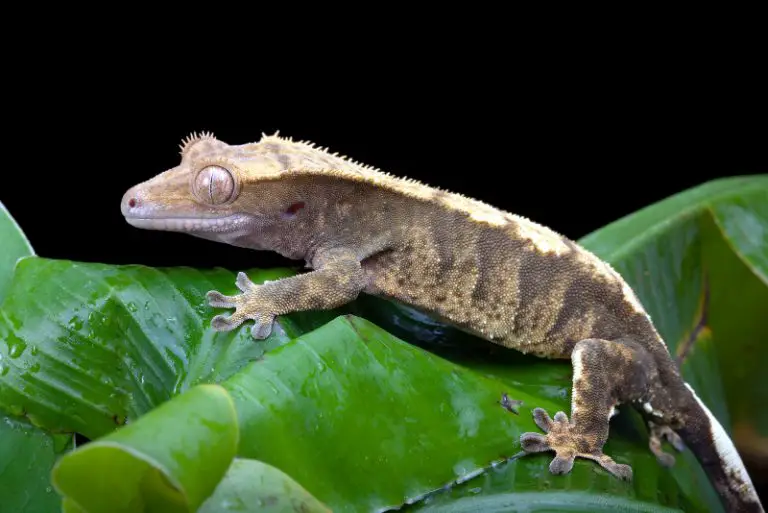
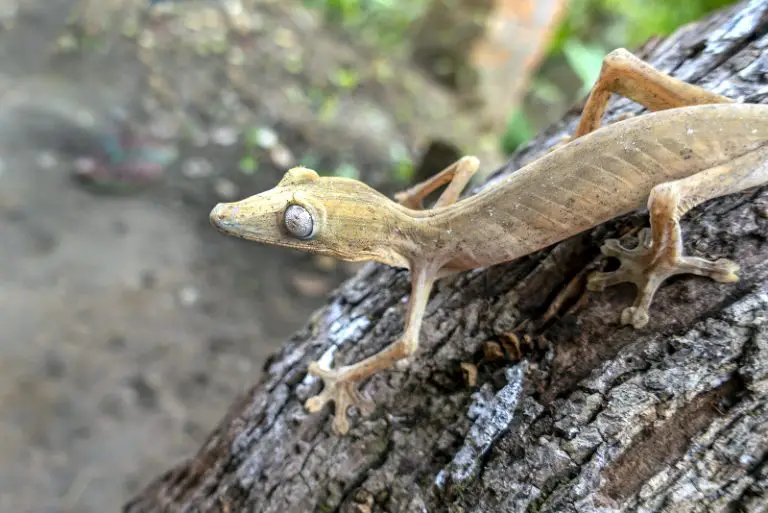
![How Often Do Crested Geckos Eat? [Full Guide]](https://allourcreatures.com/wp-content/uploads/2021/12/how-often-eat-crested-gecko-768x512.jpg)
